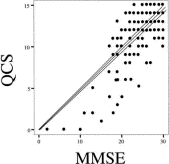The Quick Confusion Scale in the ED: Comparison with the Mini-Mental State Examination****
Presented at the Mid-Atlantic Research Meeting of the Society for Academic Emergency Medicine in York, Pennsylvania, April, 2000, and at the national meeting of the Society for Academic Emergency Medicine, San Francisco, California, May, 2000.
Affiliations
- Neurosurgery, University of Virginia Health Sciences Center, Charlottesville, VA.
To view the full text, please login as a subscribed user or purchase a subscription. Click here to view the full text on ScienceDirect.

Fig. 1
Correlation of Quick Confusion Scale testing with results for the Mini-Mental State Examination (Spearman's method; plot from SSPS showing linear regression through the origin with 95% mean prediction interval).
Fig. 2
Frequency of MMSE and QCS scores.
Abstract
The Quick Confusion Scale (QCS) is a 6-item battery of questions focusing on orientation, memory, and concentration weighted to yield a top score of 15. Analysis of the QCS compared with the Mini-Mental State Examination (MMSE) is needed to determine if the QCS is a valid marker of cognitive mental status. The MMSE and the QCS were administered to a convenience sample of 205 patients presenting to the emergency department. Exclusions included head trauma, multisystem trauma, Glasgow Coma Scale less than 15, non-English speaking, education level less than 8 years, contact or droplet isolation, acute illness, or incomplete data for reasons such as restricted patient access. Mean scores were 24.8(SD = 4.7; range 2-30) on the MMSE and 11.89 (SD = 3.5; range 0-15) on the QCS. QCS scores were significantly correlated (r =.783) with MMSE scores. The QCS appears comparable with the MMSE and is quicker to administer. (Am J Emerg Med 2001;19:461-464. Copyright © 2001 by W.B. Saunders Company)
To access this article, please choose from the options below
Purchase access to this article
Claim Access
If you are a current subscriber with Society Membership or an Account Number, claim your access now.
Subscribe to this title
Purchase a subscription to gain access to this and all other articles in this journal.
Institutional Access
Visit ScienceDirect to see if you have access via your institution.
*Supported by funds from the Office of Research, University of Virginia (to J. K. and G. S.).
**Address reprint requests to J. Stephen Huff, MD, Department of Emergency Medicine, University of Virginia Medical Center, PO Box 800699, Charlottesville, VA 22908-0699. E-mail: jshuff@virginia.edu
*0735-6757/01/1906-0001$35.00/0
Related Articles
Searching for related articles..


